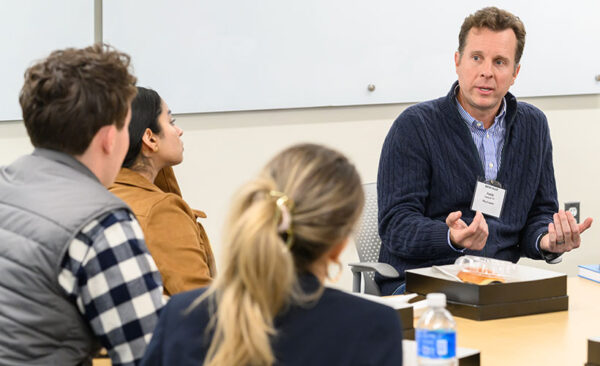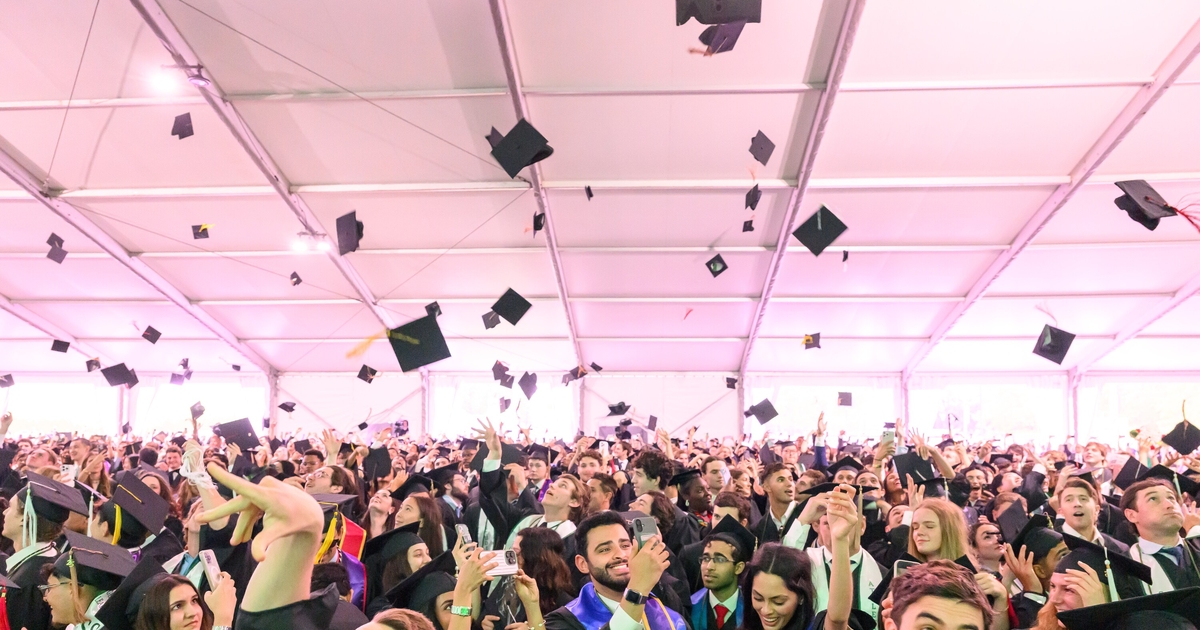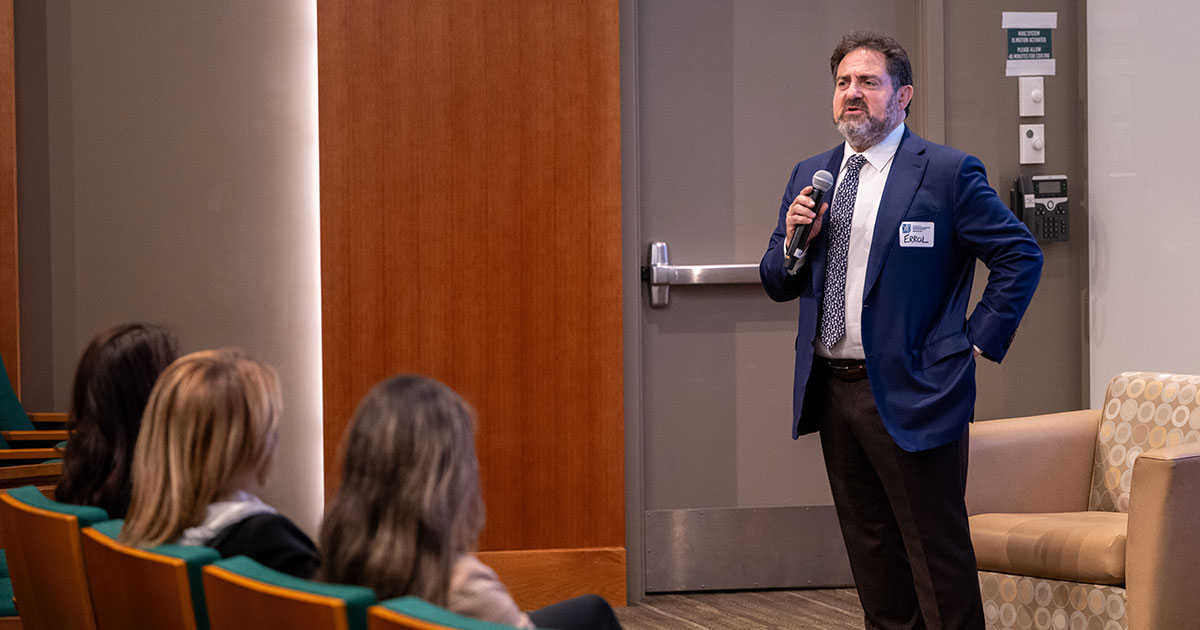The Biggest Miss in “Shark Tank” History: Ring Founder Jamie Siminoff ’99, H’21 Looks Back

When Jamie Siminoff ’99, H’21 appeared on the “Shark Tank” TV show in 2013, he had a lot on his mind. His home security venture, then known as Doorbot, was still in its early stages. Looking back on those uncertain times, he puts his concerns bluntly: “I needed money.”
Siminoff’s Doorbot is one in a long line of startups from Babson College alumni that have appeared on the long-running show. Just last year, the company Chalkless, which sells a grip enhancer for athletes, made a deal on “Shark Tank.” Over the show’s 17 seasons, the most successful deal ever made with the show’s Shark investors is generally considered to be with sock company Bombas, another business with Babson roots.
On the flip side, the biggest missed investment in “Shark Tank” history, the most valuable venture the show’s Sharks let get away, is thought to be Doorbot. The company, which eventually would change its name to Ring, would be bought by Amazon for more than $1 billion in 2018.
At a recent fireside chat at Babson, Siminoff spoke at length about his experience on “Shark Tank,” a show that gave his fledgling company crucial exposure. He is proud to be associated with it. “It has been a great show,” he said. “I think the ‘Shark Tank’ show has been so inspiring to a generation of people to show them that they can imagine and dream and build businesses and do it.”
Back in 2013, though, as Siminoff stood in front of the Sharks, he wasn’t yet a wildly successful businessman. He was an entrepreneur with a product, and he needed a deal.
Pitching the Sharks
At the fireside chat, Siminoff spoke of his entrepreneurial career with Babson President Stephen Spinelli Jr. MBA’92, PhD before a sold-out crowd at Babson’s Knight Auditorium. The event, hosted by the College’s Arthur M. Blank School for Entrepreneurial Leadership, coincided with the release of Siminoff’s new book, Ding Dong: How Ring Went from Shark Tank Reject to Everyone’s Front Door.

Before the “Shark Tank” taping, Siminoff admitted that he daydreamed about making a deal with Mark Cuban, one of the more well-known Shark investors. “I made it up in my head that I’m going to go on and pitch, and Mark is going to be like, ‘Jamie, I got this,’ ” Siminoff said.
That’s not what happened. On the show, Siminoff opened his segment by pitching his video doorbell, finishing by asking the Sharks, “Who wants to be first to ring my bell?” The Sharks were not enthused. One by one, they explained why they didn’t want to offer a deal, declaring “I’m out.” Cuban was the second to do so.
“I died for a second,” Siminoff said. “I think I actually did. I bet you if you had a heart monitor on me, I bet you I literally died.”
Running through his mind was a warning from the show’s producers. “The one thing they tell you is do not let (the Sharks) tell you they’re out,” Siminoff said. “You need to go as long as you can.” Siminoff may have been in the studio with the Sharks, but that didn’t guarantee him a spot in the episode. If his segment didn’t go well, if it ran too short, then he might not make the cut. “If they don’t get enough tape, you’re not going to go on ‘Shark Tank,’ ” Siminoff said.
One by one, the Sharks dropped out. Watch the old clip, and you see how the camera cuts to Siminoff with each rejection, his face dour. Finally, out of the five Sharks, only one remained: Kevin O’Leary.
O’Leary, who visited Babson’s campus in 2023, offered a deal. It had a steep cost. For the $700,000 Siminoff sought, O’Leary wanted a 10% royalty (to be reduced to 7% after the $700,000 was recouped), plus 5% equity in the company. Those were terms, particularly the royalty, that Siminoff couldn’t accept, even if he badly needed the money.
“You can’t make the product if you have a royalty,” he said. “There’s no way a small company could make it. You couldn’t make enough profit to do it.” If he had taken the deal, Siminoff doubts Ring would be around today.
Sitting next to Siminoff at the fireside chat, Spinelli admitted he had a different opinion when watching the episode. “I’m watching the show, screaming, ‘Take the money, Take the money,’ ” Spinelli said.
After the Taping
Leaving the show taping with no deal, Siminoff returned to the reality of his business, which was harsh. “It was definitely not good,” he said. “We owed money. We were definitely negative at that point. How negative, I don’t know, but we were not in the positive.”

The venture’s product was set to arrive from the factory, and an appearance on “Shark Tank” could provide invaluable exposure. Siminoff, however, was unsure if his segment would even make it into a “Shark Tank” episode, or if it did, when it would air. “You tape, and then you’re waiting,” he said. “You’re literally waiting by the phone.”
Timing was critical. The “Shark Tank” taping was in September, with the show’s season set to begin in October and run till the following May. Meanwhile, Doorbot’s product was arriving from the factory in late October or early November. The sooner the company could air on “Shark Tank,” the better. With no money, the venture needed the attention the show could provide as fast as possible. “If we were on the show in April or May, I don’t think we’d still be around,” Siminoff said.
Then the call came from “Shark Tank.” The Doorbot segment would air in November. “They tell you there’s going to be a huge bump in sales, so you have to prepare your website, you have to have inventory,” Siminoff said. “Inventory is not a problem. My garage is full of Doorbots.”
The sales didn’t go quite as Siminoff expected. He thought they would surge immediately after the show’s airing. Instead, they started more modestly. The first day saw $100,000 in purchases. Siminoff worried. “For a little company, it’s not bad,” he said, “but if that’s all it was, this is not good.”
Thankfully, the sales kept coming. The next day, $150,000. Then $175,000. And on and on, allowing the company to pay its factory bill and hire a couple of new engineers. “That money is what let us live,” Siminoff said. “That was the adrenaline boost we got. That then created the flywheel of Ring that let us get to the next level.”
Without that appearance on “Shark Tank,” Siminoff said, “Ring would not exist.” Since then, he has reappeared on the show as a guest and become friendly with the Sharks. “They are great people,” Siminoff said. “It has been fun to be a part of that family.”
READ MORE: Beyond his experiences on “Shark Tank,” Jamie Siminoff ’99, H’21 also talked at the fireside chat about his entrepreneurial career and how he built Ring. Check out this article to hear highlights from the event.




